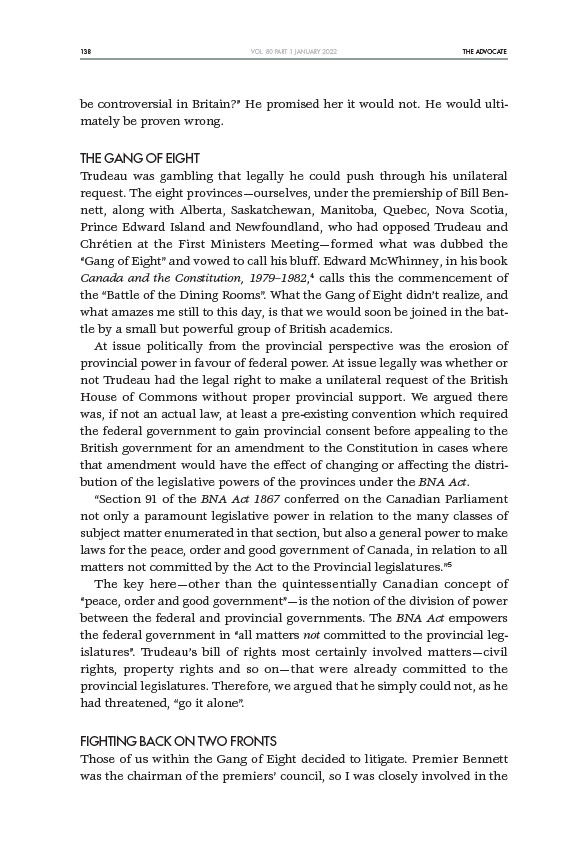
138 THE ADVOCATE
VOL. 80 PART 1 JANUARY 2022
be controversial in Britain?” He promised her it would not. He would ultimately
be proven wrong.
THE GANG OF EIGHT
Trudeau was gambling that legally he could push through his unilateral
request. The eight provinces—ourselves, under the premiership of Bill Bennett,
along with Alberta, Saskatchewan, Manitoba, Quebec, Nova Scotia,
Prince Edward Island and Newfoundland, who had opposed Trudeau and
Chrétien at the First Ministers Meeting—formed what was dubbed the
“Gang of Eight” and vowed to call his bluff. Edward McWhinney, in his book
Canada and the Constitution, 1979–1982,4 calls this the commencement of
the “Battle of the Dining Rooms”. What the Gang of Eight didn’t realize, and
what amazes me still to this day, is that we would soon be joined in the battle
by a small but powerful group of British academics.
At issue politically from the provincial perspective was the erosion of
provincial power in favour of federal power. At issue legally was whether or
not Trudeau had the legal right to make a unilateral request of the British
House of Commons without proper provincial support. We argued there
was, if not an actual law, at least a pre-existing convention which required
the federal government to gain provincial consent before appealing to the
British government for an amendment to the Constitution in cases where
that amendment would have the effect of changing or affecting the distribution
of the legislative powers of the provinces under the BNA Act.
“Section 91 of the BNA Act 1867 conferred on the Canadian Parliament
not only a paramount legislative power in relation to the many classes of
subject matter enumerated in that section, but also a general power to make
laws for the peace, order and good government of Canada, in relation to all
matters not committed by the Act to the Provincial legislatures.”5
The key here—other than the quintessentially Canadian concept of
“peace, order and good government”—is the notion of the division of power
between the federal and provincial governments. The BNA Act empowers
the federal government in “all matters not committed to the provincial legislatures”.
Trudeau’s bill of rights most certainly involved matters—civil
rights, property rights and so on—that were already committed to the
provincial legislatures. Therefore, we argued that he simply could not, as he
had threatened, “go it alone”.
FIGHTING BACK ON TWO FRONTS
Those of us within the Gang of Eight decided to litigate. Premier Bennett
was the chairman of the premiers’ council, so I was closely involved in the